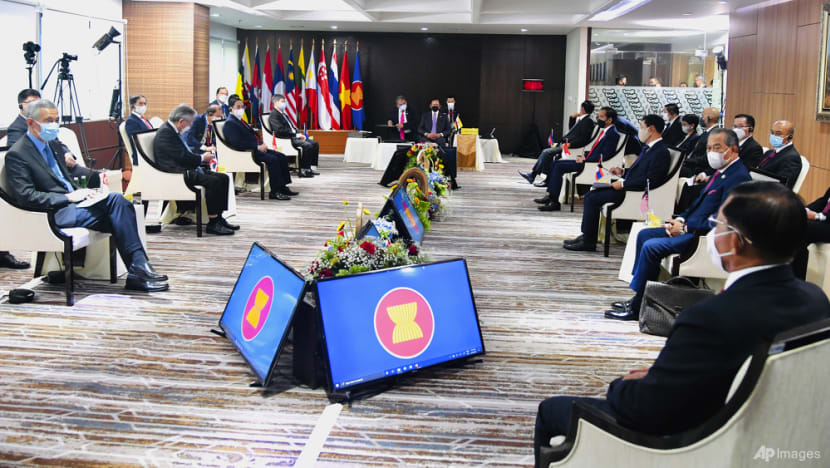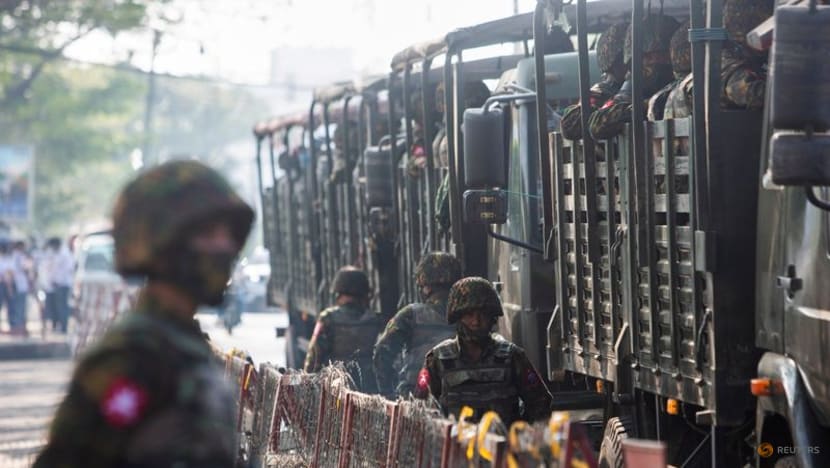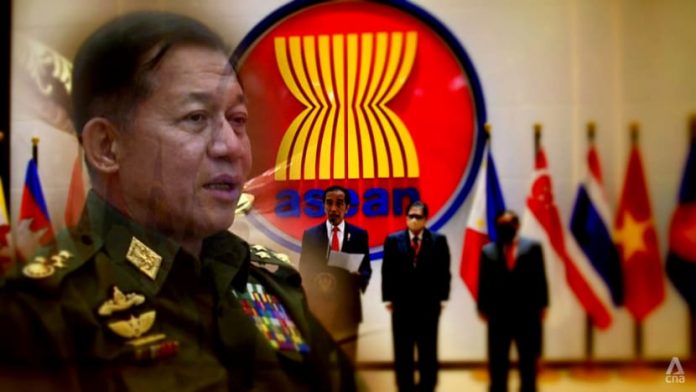ASEAN’s decision to invite a non-political representative from Myanmar to its Summits later this month sets a new precedent for the grouping’s dealings with Myanmar.
This is the first time that ASEAN has publicly set conditions for a member state’s representation at key high-level political meetings.
The decision, announced by ASEAN Chair Brunei the day after it was made by an emergency ASEAN Foreign Ministers’ Meeting on Oct 15, underscores the challenges of reaching a negotiated compromise on Myanmar’s attendance at the 38th and 39th ASEAN Summits and related Summits scheduled for Oct 26 to 28.
On the one hand, the decision suggests unease over the State Administration Council’s (SAC) visibility at high-level regional forums as Myanmar’s legitimate government. On the other hand, another view within ASEAN is that it should work with the SAC to bring about a resolution to the ongoing Myanmar crisis.
After all, the SAC is the party primarily responsible for the ongoing domestic political crisis that has resulted from the Feb 1 coup.
Who represents Myanmar?
Interest in who represents Myanmar internationally increased when the parallel National Unity Government (NUG) emerged in April as a key part of the resistance against the coup.
ASEAN – which convened a special Leaders’ Meeting on Apr 24 to discuss the grouping’s response to the Myanmar crisis – became the cynosure of attention.
ASEAN invited junta chief Senior General Min Aung Hlaing to that meeting to impress upon him the importance of committing to an ASEAN-coordinated process towards resolving the crisis.

Criticism of ASEAN’s move grew when the SAC started qualifying its agreement to the Five-Point Consensus reached at the Leaders’ Meeting.
The SAC did itself no favours: It has not heeded the Consensus’ requirement to cease violence. Junta security forces continued shooting and detaining protesters, and airstrikes against ethnic armed organisations increased in the week following the meeting.
The SAC, leveraging ASEAN’s goodwill, stalled the proposed mid-May visit of the ASEAN Special Envoy (SE), citing stability as a reason. The SAC’s stonewalling of the SE’s request in October to meet with deposed State Counsellor Daw Aung San Suu Kyi, caused the SE to cancel his visit, standing by his earlier statement not to visit Myanmar without access “to all parties concerned”.
At the United Nations (UN) level, in September, the United States and China had agreed that Myanmar’s UN seat would continue to be occupied by the incumbent (appointed by the National League for Democracy government) until further decision in November.
This raised expectations that the ASEAN Summits, and related meetings with Dialogue Partners in October, would not see Min Aung Hlaing in Myanmar’s seat.
SAC dealt another blow
ASEAN’s decision on Oct 15, indicated first in a tweet by Indonesia’s Foreign Minister, caused many Myanmar social media users to exult that the SAC had been dealt another blow.
The SAC’s reactions indicate that ASEAN’s decision is in the nature of a blow. Statements from Myanmar’s Ministry of Foreign Affairs in the past few days justified accommodating the SE’s proposed visit, and objected to the emergency ASEAN meeting’s decision, accusing ASEAN of using pressure.
The SAC spokesperson blamed foreign intervention for ASEAN’s decision. Announcing a prisoner amnesty on Oct 18, Min Aung Hlaing complained that ASEAN focused solely on the SAC regarding cessation of violence.
Sources have shared, however, that some member states were already pondering ASEAN’s course of action even before the UN Secretary-General postponed the regular ASEAN-UN Meeting earlier in October.
This postponement has been attributed to the UN Secretary-General’s reluctance to be seen at the same table with the SAC representing Myanmar, before the UN Credentials Committee’s November decision.
ASEAN’s decision will come as a relief to several of its Dialogue Partners. ASEAN’s business-as-usual meetings on virtual platforms have shown representatives of Dialogue Partner countries on screen together with the SAC in Myanmar’s seat.
A delicate balance
However, image is important for Summitry. Recognising this, ASEAN has made an effort to differentiate between Myanmar the state, and Myanmar as represented by the SAC.
This is not easy. ASEAN members also differed on the level of Myanmar’s representation at the Summits.
The agreement on a non-political representative from Myanmar at the Summits is also an effort to sidestep the sticking point of the NUG requests to ASEAN. Though there is no consensus on entertaining these requests, some member states have unilaterally decided to engage the NUG discreetly.

The NUG also continues its efforts to engage with ASEAN. Similar to its response to the Five-Point Consensus in April, the NUG issued a response to the emergency ASEAN meeting decision, urging ASEAN “to ensure the Myanmar representative could objectively represent the interest of Myanmar and its people” and offering to recommend some names.
With no clear provisions on how to treat a member state with ambiguous or competing assertions of legitimate representation, keeping Myanmar’s seat empty – even temporarily – may not sit too well with some member states.
ASEAN’s insistence on a non-political representative is as close to a time-out that the grouping can get while striving to maintain some form of continuity to pursue its Five-Point Consensus.
It seems likely, however, that Myanmar’s representative may yet be one indirectly representing the SAC, whether a senior civil servant or separately nominated.
The speaking rights of this representative are also unclear, though the unequal level of representation and the context of Myanmar’s presence at the Summits suggest that the Myanmar representative may have limited speaking rights.
As Barry Desker notes, excluding Min Aung Hlaing from the summits would mark the beginning of a more effective approach to the problem, given ASEAN’s limited impact of persuasion and consultations amid the absence of legal recourses and effective rules.
ASEAN’s snub of Min Aung Hlaing is a blow to his quest for recognition as the legitimate leader of Myanmar.
But this is not the final chapter. The key question here is whether ASEAN would summon up enough collective will to apply the “speak softly and carry a big stick” adage in the future.
By Moe Thuzar / Channel News Asia
The views and opinions expressed in this article are solely those of the author and do not necessarily reflect the position of AsiaWeReview.




